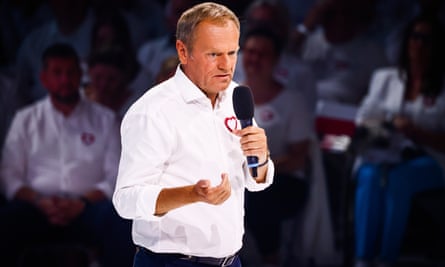Poland’s political parties turn to mud-slinging as election nears | Poland

In just the first week of campaigning for Poland’s parliamentary elections, which will take place on 14 October, there have been allegations of politically manipulated interest rate cuts, the firing of a deputy foreign minister after visas were allegedly sold to people outside the EU and the publication of a Senate commission report claiming that intelligence services illegally used spyware to monitor opposition politicians around the time of the 2015 polls.
Allegations of foreign interference have been made against Russia and Germany, the latter accused by government ministers of trying to manipulate voters who support Donald Tusk’s opposition party, Civic Platform.
The language deployed by the ruling rightwing populist Law and Justice (Pis) party can seem unbridled. Jarosław Kaczyński, its leader, has described Tusk as the personification of evil, an “enemy of Poland” and a “pest”. At the launch of the PiS campaign Tusk was described as an “external party” with “decision-making centres outside Poland”. In a speech in Katowice, Mateusz Morawiecki, the prime minister, warned that the opposition was preparing a “women’s hell” featuring “rapes, robberies, murders” and “young, rootless immigrants storming the borders”.
The outcome of the Polish elections is seen as pivotal to the future of the EU and the outcome of the war in Ukraine.
Donald Tusk, the former European Council president, is fighting an uphill battle with his pro-European stance. Photograph: Beata Zawrzel/NurPhoto/Shutterstock
“This is probably the most important election in Poland since 1989 and certainly the most important inside the EU this year,” said Bartosz Kubiak, head of the Warsaw office of the Aspen Institute thinktank. “Depending on the outcome, the country will either reorientate itself as a euro-enthusiastic rising democracy or will commit further to an illiberal turn at loggerheads with Europe over the rule of law and enlargement.”
If the ruling PiS is unseated the EU’s fifth most populous country will no longer be seen as an adversary in Brussels. The polls suggest that the party, which came to power in 2015 and is led by a fissiparous group of social conservatives, will need seats won by the far-right Confederation party to assemble a working majority.
Confederation, an amalgam of old-time nationalists and a new breed of economic libertarians, is polling at about 10%.
Like many far-right parties in Europe, it has been trying to clean up its image, but cannot erase videos of its leaders condemning Jews, gay people, abortion, the EU and Muslims. Attractive to younger male professionals, it is social media savvy. At a conference in Wrocław last week Slawomir Mentzen, its co-leader, told the assembled businessmen to support lower, simpler taxes. Even critics of Mentzen in Wrocław’s business community admitted that the 36-year-old always arrived at such debates well briefed.
Confederation insists it will not strike a deal with PiS and instead will demand a fresh poll. However, Aspen’s Kubiak believes the result will be so narrow that fresh elections will be required within a minimum of two years.
 Even Slawomir Mentzen’s critics admit that he comes well-briefed to debates. Photograph: Klaudia Radecka/NurPhoto/Shutterstock
Even Slawomir Mentzen’s critics admit that he comes well-briefed to debates. Photograph: Klaudia Radecka/NurPhoto/Shutterstock
Much will depend on whether Tusk, the leader of the centre-right but pro-European Civic Platform who is the former EU Council president, will be able to extend his appeal to large swathes of undecided voters. One survey last week showed that nearly a fifth of those planning to vote in the elections still do not know who they will pick. Tusk, often accused of having no policies except opposition to the PiS, has attempted to answer the charge by presenting 100 commitments for 100 days. If he loses it will not be because he did not go big. Money was offered to cover in vitro fertilisation, maintenance allowance for single parents and grandmothers with caring duties.
skip past newsletter promotion
Sign up to This is Europe
The most pressing stories and debates for Europeans – from identity to economics to the environment
„,”newsletterId”:”this-is-europe”,”successDescription”:”We’ll send you This is Europe every week”}” clientOnly config=”{„renderingTarget”:”Web”}”>Privacy Notice: Newsletters may contain info about charities, online ads, and content funded by outside parties. For more information see our Privacy Policy. We use Google reCaptcha to protect our website and the Google Privacy Policy and Terms of Service apply.
after newsletter promotion
But Tusk, a familiar politician about whom many Poles have fixed views, is up against a state and media machine stacked against him. Independent media exists but state TV is largely a mouthpiece of the PiS.
The opposition has cried foul over the decision by the independent Central Bank to cut interest rates by 0.75% at a time when inflation is still above 10%, and has claimed that the move was designed to boost support for PiS among homeowners on variable mortgages.
There are also deep concerns over PiS’s decision to hold four referendums on hot-button issues on polling day in an attempt to boost turnout and open further avenues for campaign spending, and over so-called “information picnics” attended by ministers, at which people can eat food and ask questions about government policies.
That Polish politics is fatally polarised is hardly a revelation but Kubiak said the trend was worsening. “Polish electoral campaigns from 2015 have become increasingly reliant on identity politics,” Kubiak said. “We are seeing a shift away from using a political programme as the means to convince voters at the expense of very emotional and polarising messaging.”





